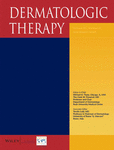Oral Isotretinoin for the treatment of Aripiprazol-induced acneiform rash
Abstract
Acneiform rash is a commonly reported side effect to certain types of medications, including antipsychotic agents. Its clinical presentation consists mainly of papulopustular lesions. Other types of lesions, such as nodular or cystic, can also be observed. Body distribution of the lesions follows a similar pattern to acne vulgaris. Depending on the severity of the case, drug-induced acne may be treated in different ways. In mild cases, the use of topical antibiotics and retinoids in combination is usually effective. With more severe forms, it may be necessary to add oral antibiotics, such as tetracyclines, but a good response is not always achieved. Identification of the drug responsible for the side-effect is mandatory in refractory eruptions. Herein, we present the case of an Aripiprazole-induced acneiform rash successfully treated with oral Isotretinoin. The treatment was effective and well tolerated and there was no need to discontinue the psychopharmacological medication. This is the first study to report this modality of treatment.
CONFLICT OF INTEREST
None.




